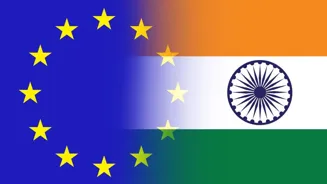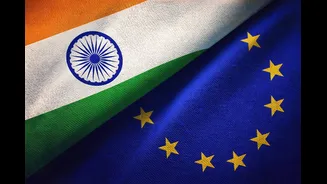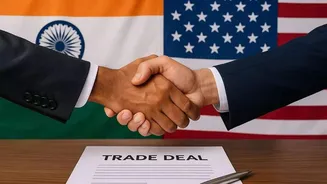What is the story about?
Government sources have indicated that India and the European Union (EU) look to conclude negotiations for a proposed Free Trade Agreement (FTA) by the year-end.
While some movement is expected in the 13th round of FTA negotiations in India next month, sources added that guidance will be taken from Ministers on both the sides on remaining issues which may need a political call. EU's Trade Commissioner Maroš Šefčovič is expected to meet India's Commerce and Industry Piyush Goyal during the scheduled talks next month.
Both sides had exchanged offers related to their services sectors during the 12th round of negotiations which concluded in Brussels last month. Key interest areas in the domain of market access for goods were discussed at the time.
In June 2025, government sources had told CNBC-TV18 that extra sessions were being held in the India-European Union (EU) Free Trade Agreement (FTA) negotiations with the frequency of meetings having increased from quarterly to monthly.
CNBC-TV18 had earlier reported that India and the EU were keeping options open for an early harvest deal, like the one India had signed with Australia. The early harvest deal will include issues like tariff and non-tariff barriers, Intellectual property rights, government procurement, technical barriers to trade, and Sanitary and Phytosanitary Measures.
India and the EU are pursuing a two-stage approach to finalise an FTA, apart from a bilateral investment protection agreement and recognition of geographical indications (GIs) with the 27-member bloc.
Also Read: Japan's trade negotiator cancels US visit over tariff deal snag
The negotiations span 23 policy areas, including trade in goods and services, investment protection, customs procedures, technical barriers, intellectual property rights, and sustainable development. Previous rounds of negotiations have successfully closed five more chapters of the 23, sources said.
India has also communicated concerns over the Regulation on Deforestation-free Products (EUDR) and Carbon Border Adjustment Mechanism (CBAM), measures that have also faced criticism from EU businesses as well.
As per a government official, the EU has objected to Quality Control Orders (QCOs) by terming them non-tariff barriers (NTBs), to which India has responded by saying that QCOs equally apply to Indian businesses unlike EU's internal concessions for its Small and Medium Enterprises (SMEs).
In return, India has offered that mutual recognition can be given by both the sides in areas like Technical Barriers to Trade (TBT) and Sanitary and Phytosanitary (SPS) Measures. The government official added that good relations with the EU are reflected in the ongoing strategic dialogue, with the 27-member bloc displaying sensitivity to India's flagged concerns.
In June, India's Commerce and Industry Minister Piyush Goyal had met EU's Commissioner for Trade and Economic Security, Interinstitutional Relations and Transparency Maroš Šefčovič, the European Commissioner for Agriculture and Food Christophe Hansen, and Ministers from EU member countries France, Italy, and Sweden to provide a significant impetus to ongoing FTA negotiations.
While the EU has sought amendments in India’s Patents Act to allow ‘evergreening’ of patents in pharmaceuticals, India has already refused to accept similar demands from the UK and Switzerland for data exclusivity to protect generic pharma industry as part of FTAs with the UK and the European Free Trade Association (EFTA).
In FY 2023-24, EU-India bilateral goods trade stood at $137.41 billion, with Indian exports valued at $75.92 billion and imports valued at $61.48 billion making EU India's largest trading partner in goods. The EU accounts for nearly 17% of India’s total exports, while EU's exports to India represent 9% of its total overseas sales.




















